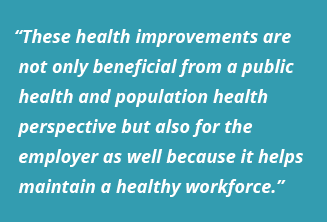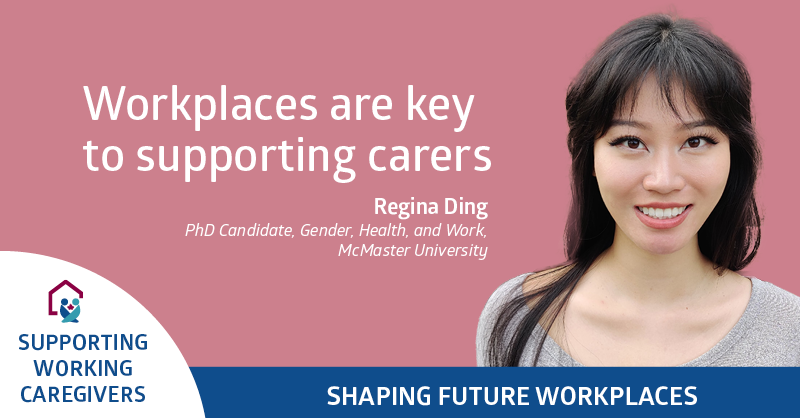The impact of the workplace on the lives of carer-employees
Educational programs in the workplace can generate improvements for carer-employee health, demonstrating that workplaces are instrumental in supporting carer-wellbeing and a healthy workforce.
As a formally classified aging nation, the number of older adults (65 years+) in Canada are increasing year after year – numbering 7 million in 2021.[i] For many people, their first experience with aging comes not from themselves but as carers for older family and relatives. Navigating one’s career on top of managing a family member’s health condition can be a difficult and health compromising journey.
In the fall of 2016, a multi-phase research project was initiated, headed by researchers from the Gender, Health and Work research group at McMaster University. The goal was to improve the lived experiences of individuals simultaneously juggling paid employment alongside the provision of care to friends or family, through workplace culture change and carer-supportive policies and programs.
An educational intervention was introduced to a large-size workplace in the education sector, focusing on educating carer-employees on supports and resources in the community and workplace, as well as provincial and federal programs. Forty-three participants were originally recruited; however, half left the study due to cessation of caregiving responsibilities, time constraints because of increased responsibilities, or for reasons not disclosed. Twenty-one participants were therefore followed longitudinally.
 The educational intervention consisted of an in-person meeting with each participant. Demographic, self-reported health, and employment data were collected and entered into a web-based decision tool [ii], which then produced a customized list of caregiving and work-related resources tailored to the carer-employee participant. These options were explored in detail between the researcher and participant. Participants were provided a list of behaviour change goals and encouraged to focus on accomplishing two of these goals. Participant progress on the behaviour change checklist activity, and health status were then followed up at 6 months and 12 months. Three tools were used to reflect wellbeing: self-reported health (SF-12), carer reaction (CRA), and depression (CES-D). A series of random-intercept models were created to assess for changes in participant health.
The educational intervention consisted of an in-person meeting with each participant. Demographic, self-reported health, and employment data were collected and entered into a web-based decision tool [ii], which then produced a customized list of caregiving and work-related resources tailored to the carer-employee participant. These options were explored in detail between the researcher and participant. Participants were provided a list of behaviour change goals and encouraged to focus on accomplishing two of these goals. Participant progress on the behaviour change checklist activity, and health status were then followed up at 6 months and 12 months. Three tools were used to reflect wellbeing: self-reported health (SF-12), carer reaction (CRA), and depression (CES-D). A series of random-intercept models were created to assess for changes in participant health.
Overall, there were two main findings:
1) The educational intervention was effective at significantly improving health outcomes for participants, specifically in self-reported general health, depression, and psychosocial health
2) This effect was strongest immediately after the intervention, suggesting a repeat of the educational intervention after six months might be helpful.
For employers, this result is promising. Not only does it present evidence that an education-based intervention can improve employee health but suggests that employers may also enjoy the benefits of a positive reputation and employee retention due to availability of these resources. Educational interventions in workplaces are also relatively low-cost and often make use of existing infrastructure (ex. HR) to minimize costs while maximizing benefits. Overall, this paper adds to the business case for supporting carer-employees and sets the foundation for future research.
Read the published article
References
[i] Retrieved on January 12, 2022, from https://www.statcan.gc.ca/en/subjectsstart/older_adults_and_population_aging
[ii] This tool was developed specifically for the research and resources were not available to continue maintaining the database of caregiver supports.
ABOUT THE PROJECT
Carers Canada is leading the knowledge mobilization activities for a multi-sectorial research program to spread and scale a carer-friendly workplace standard, known as the Carer-Inclusive and Accommodating Organizations’ Standard (CSAB701-17). Led by Dr. Allison Williams, CIHR Research Chair in Gender, Work and Health at McMaster University, the research program consists of six inter-related sub-projects that will: increase awareness of the standard across Canada; evaluate readiness to change; determine feasibility and cost benefit; embrace cultural competency; consider Indigenous perspectives; and create an international standard. Visit PARTNERSHIP PROJECT SITE here

CIHR/SSHRC Healthy Productive Work Partnership Grant “Scaling up the Career Inclusive Accommodating Organizations Standard” FRN: HWP-146001 (CIHR); 890-2016-3018 (SSHRC).
 Regina DingFebruary 3, 2022
Regina DingFebruary 3, 2022

The impact of the workplace on the lives of carer-employees
Educational programs in the workplace can generate improvements for carer-employee health, demonstrating that workplaces are instrumental in supporting carer-wellbeing and a healthy workforce.
As a formally classified aging nation, the number of older adults (65 years+) in Canada are increasing year after year – numbering 7 million in 2021.[i] For many people, their first experience with aging comes not from themselves but as carers for older family and relatives. Navigating one’s career on top of managing a family member’s health condition can be a difficult and health compromising journey.
In the fall of 2016, a multi-phase research project was initiated, headed by researchers from the Gender, Health and Work research group at McMaster University. The goal was to improve the lived experiences of individuals simultaneously juggling paid employment alongside the provision of care to friends or family, through workplace culture change and carer-supportive policies and programs.
An educational intervention was introduced to a large-size workplace in the education sector, focusing on educating carer-employees on supports and resources in the community and workplace, as well as provincial and federal programs. Forty-three participants were originally recruited; however, half left the study due to cessation of caregiving responsibilities, time constraints because of increased responsibilities, or for reasons not disclosed. Twenty-one participants were therefore followed longitudinally.
 The educational intervention consisted of an in-person meeting with each participant. Demographic, self-reported health, and employment data were collected and entered into a web-based decision tool [ii], which then produced a customized list of caregiving and work-related resources tailored to the carer-employee participant. These options were explored in detail between the researcher and participant. Participants were provided a list of behaviour change goals and encouraged to focus on accomplishing two of these goals. Participant progress on the behaviour change checklist activity, and health status were then followed up at 6 months and 12 months. Three tools were used to reflect wellbeing: self-reported health (SF-12), carer reaction (CRA), and depression (CES-D). A series of random-intercept models were created to assess for changes in participant health.
The educational intervention consisted of an in-person meeting with each participant. Demographic, self-reported health, and employment data were collected and entered into a web-based decision tool [ii], which then produced a customized list of caregiving and work-related resources tailored to the carer-employee participant. These options were explored in detail between the researcher and participant. Participants were provided a list of behaviour change goals and encouraged to focus on accomplishing two of these goals. Participant progress on the behaviour change checklist activity, and health status were then followed up at 6 months and 12 months. Three tools were used to reflect wellbeing: self-reported health (SF-12), carer reaction (CRA), and depression (CES-D). A series of random-intercept models were created to assess for changes in participant health.
Overall, there were two main findings:
1) The educational intervention was effective at significantly improving health outcomes for participants, specifically in self-reported general health, depression, and psychosocial health
2) This effect was strongest immediately after the intervention, suggesting a repeat of the educational intervention after six months might be helpful.
For employers, this result is promising. Not only does it present evidence that an education-based intervention can improve employee health but suggests that employers may also enjoy the benefits of a positive reputation and employee retention due to availability of these resources. Educational interventions in workplaces are also relatively low-cost and often make use of existing infrastructure (ex. HR) to minimize costs while maximizing benefits. Overall, this paper adds to the business case for supporting carer-employees and sets the foundation for future research.
Read the published article
References
[i] Retrieved on January 12, 2022, from https://www.statcan.gc.ca/en/subjectsstart/older_adults_and_population_aging
[ii] This tool was developed specifically for the research and resources were not available to continue maintaining the database of caregiver supports.
Regina is a final year PhD Candidate at McMaster University, researching population health and aging. Her dissertation focuses on the program evaluation of a workplace carer intervention for carers. Regina has an interdisciplinary background in life sciences and environmental sciences prior to her work at McMaster, although she has always been interested in knowledge translation and scientific policy.
FAVORITE PASTIME: Most recently, pottery.
Twitter: @DingRegina
LinkedIn: @regina-ding-b53b871a1
ABOUT THE PROJECT
Carers Canada is leading the knowledge mobilization activities for a multi-sectorial research program to spread and scale a carer-friendly workplace standard, known as the Carer-Inclusive and Accommodating Organizations’ Standard (CSAB701-17). Led by Dr. Allison Williams, CIHR Research Chair in Gender, Work and Health at McMaster University, the research program consists of six inter-related sub-projects that will: increase awareness of the standard across Canada; evaluate readiness to change; determine feasibility and cost benefit; embrace cultural competency; consider Indigenous perspectives; and create an international standard. Visit PARTNERSHIP PROJECT SITE here

CIHR/SSHRC Healthy Productive Work Partnership Grant “Scaling up the Career Inclusive Accommodating Organizations Standard” FRN: HWP-146001 (CIHR); 890-2016-3018 (SSHRC).